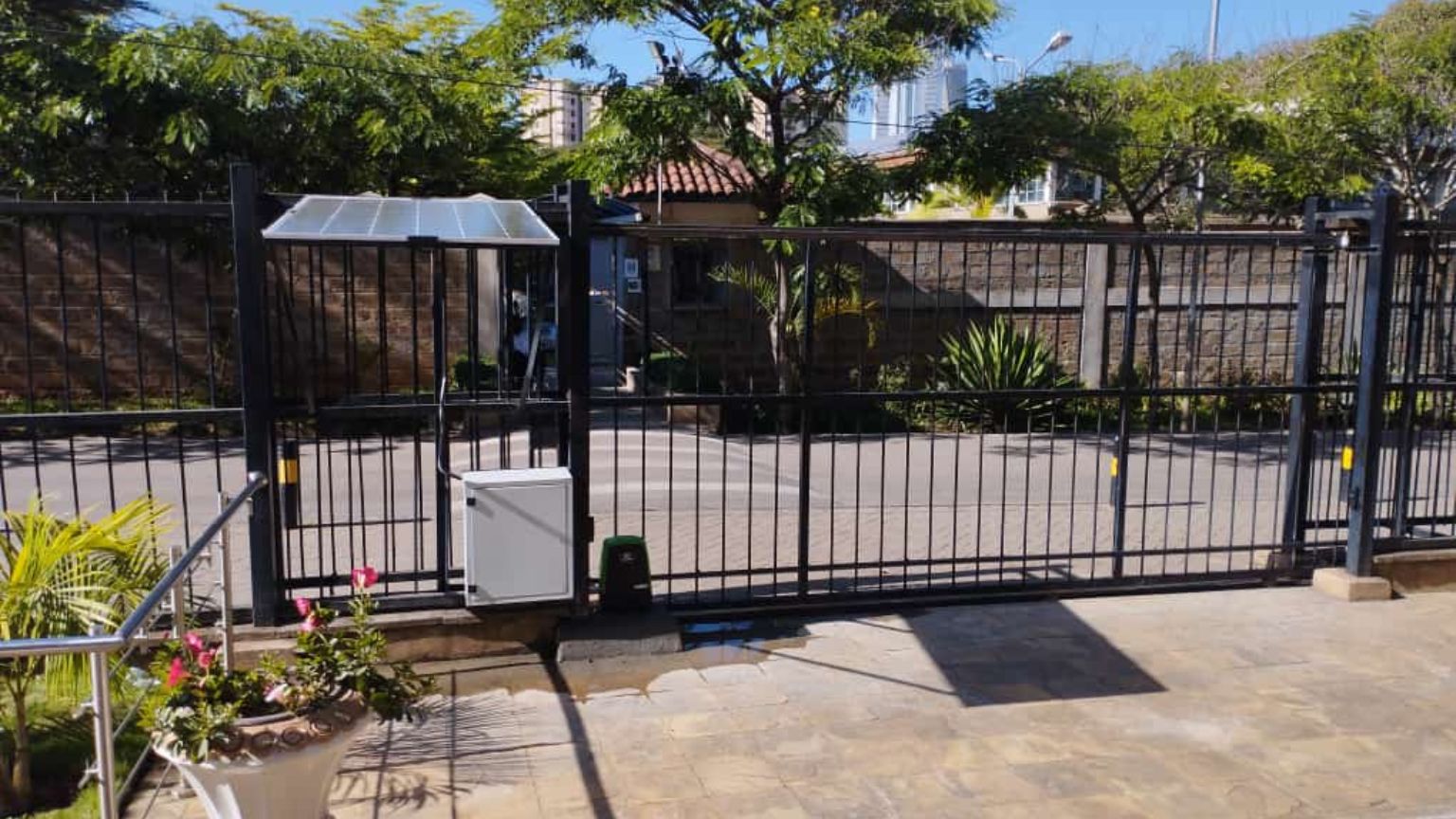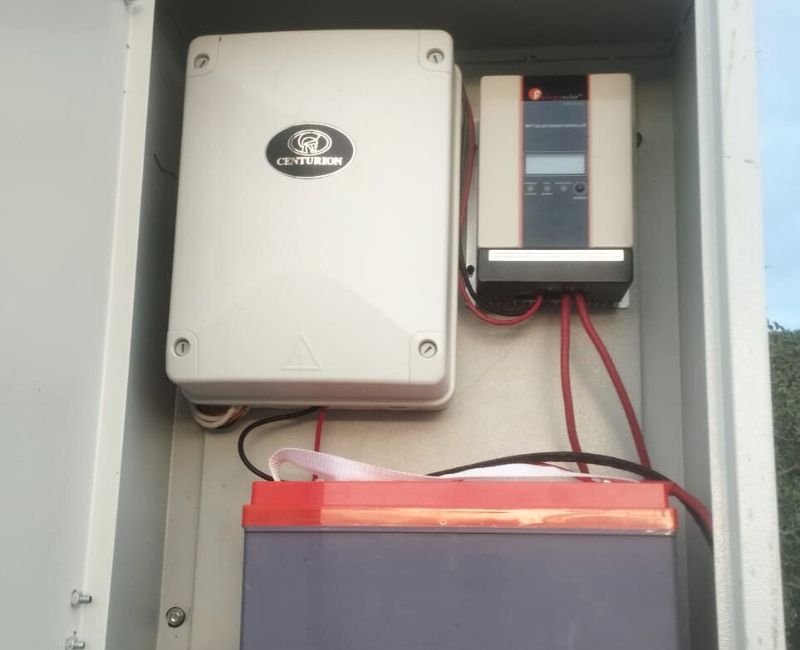Supply, Installation, Testing, and Commissioning of Automatic Gate Systems in Kenya
Automatic gate systems are a cornerstone of modern security, providing convenience and enhanced safety for both residential and commercial properties. In Kenya, the demand for automatic gates has surged as businesses and homeowners seek reliable solutions to control access, improve security, and automate property management. The following offer a hint on the sSupply and Installation of Automatic Gate Systems in Kenya offering insights into costs, benefits, and key considerations.
1. Supply of Automatic Gate Systems in Kenya
The supply of automatic gate systems in Kenya has diversified, with many providers offering a variety of options to meet different needs. Whether for homes, businesses, or industrial properties, gate automation systems come in different types, sizes, and functionalities. The supply process generally involves the following elements:
- Gate Automation Components: These include gate motors, openers, and control systems (keypads, remote controls, sensors). Suppliers also provide motorized gates for both sliding and swing gate systems, depending on the specific requirements of the client.
- Automatic Gates Kenya: Companies like Automatic Gates Kenya offer a range of gate automation systems designed to suit different property types and uses, from residential to commercial applications. These gates are equipped with advanced safety features such as obstruction sensors and emergency release mechanisms.
- Motorized Gates Kenya: Available in both sliding and swing models, motorized gates provide efficient, automated entry and exit control. For homes, motorized gates add convenience and security, while for businesses, they help in regulating vehicle traffic.
For more information on supply options, visit Automatic Gates Kenya.
2. Installation of Automatic Gates in Kenya
Gate installation is a critical phase in ensuring the system functions smoothly and securely. Proper installation not only affects the gate’s performance but also its longevity. Here is a breakdown of the installation process:
- Site Assessment: Before any installation, a professional site assessment is conducted to determine the ideal type of gate and its positioning. Factors considered include property layout, the size of the gate, and any obstacles that could affect installation, such as uneven terrain.
- Gate and Motor Installation: Once the site is assessed, the gate motor is fitted according to the gate type—whether sliding or swing. Sliding gates typically require tracks along the ground, while swing gates need space to open and close smoothly.
- Electrical Connections: Automatic gates rely on electric motors, and the installation involves connecting these motors to the property’s electrical system or to solar-powered systems for off-grid solutions. In Kenya, solar-powered gates are becoming more popular, especially in rural or power-limited areas.
- Remote Control and Keypad Setup: After installing the physical gate, the next step is configuring the control system, which may include remote control, keypad access, or integration with smartphone apps for added convenience.
For expert installation services, visit Automatic Gates Kenya for more details, or Electric Fences Kenya for related security solutions.
3. Testing and Commissioning of Automatic Gate Systems
After installation, the gate must undergo rigorous testing to ensure that all components function correctly. Testing and commissioning of automatic gates involve the following steps:
- Functional Testing: Technicians test the gate’s opening and closing mechanisms, ensuring the gate motor responds properly to remote control signals or keypad entries. Sensors, safety features, and obstruction detection systems are also checked.
- Load Testing: This involves testing the gate’s ability to operate under load, ensuring that the motor can handle the weight and frequency of use, particularly in high-traffic areas like businesses and apartment complexes.
- Safety Checks: Safety is paramount in gate automation. Testing includes ensuring that the gate stops or reverses when encountering an obstacle. Emergency manual release mechanisms are also checked to ensure that the gate can be operated during power outages or emergencies.
Once all systems are tested and functional, the gate is officially commissioned, and the client is trained on its use, maintenance, and troubleshooting. For professional services, visit Automatic Gates Kenya to schedule an installation and commissioning.
4. Maintenance and Repair of Automatic Gates in Kenya
Maintenance is essential for ensuring the longevity and reliability of an automatic gate system. Gate maintenance in Kenya generally involves routine inspections, lubrication of moving parts, and checking the integrity of the electrical systems. Here’s what you need to know:
- Regular Maintenance: Regular maintenance includes checking the gate motor, lubricating moving parts like tracks and hinges, and ensuring the remote control system is functional. This type of maintenance helps to prevent breakdowns and extend the lifespan of the gate.
- Repair Services: Despite regular maintenance, automatic gates can sometimes develop issues due to wear and tear or unforeseen accidents. Common problems include motor failure, obstruction sensor malfunctions, or remote control issues. Gate repair services in Kenya are available for both sliding and swing gates, with technicians capable of troubleshooting and resolving a wide range of issues.
For expert gate repair services in Kenya, visit Electric Fences Kenya or contact Automatic Gates Kenya.
5. Cost of Automatic Gate Systems in Kenya
The cost of automatic gate installation in Kenya can vary based on several factors, including the type of gate, materials used, motor specifications, and any additional features such as remote control or keypad access. Here’s a cost breakdown:
- Sliding Gates: Sliding gates tend to be more expensive due to the need for ground tracks and heavier-duty motors. The average cost for sliding gate automation in Kenya ranges between Ksh 100,000 and Ksh 300,000, depending on the gate’s size and the motor’s power.
- Swing Gates: Swing gates are typically less expensive than sliding gates, with installation costs ranging from Ksh 80,000 to Ksh 200,000, depending on the gate size and features. These gates require less structural support but need adequate space for full motion.
- Additional Costs: Features like solar-powered gates, remote control systems, or advanced security sensors add to the overall cost. Installation costs also vary depending on the complexity of the project and the need for specialized components.
For a customized quote, contact Automatic Gates Kenya or visit www.automaticgates.co.ke to explore different gate automation options.
Conclusion
Automatic gate systems in Kenya offer enhanced security, convenience, and modernity for residential and commercial properties alike. From supply and installation to testing, commissioning, and long-term maintenance, these systems are a worthwhile investment for safeguarding your property. The wide range of options available, from sliding to swing gates, ensures that every client can find a solution tailored to their specific needs and budget.
To inquire about gate automation services, contact Automatic Gates Kenya at 0722708034 or 0720 456534, or email info@automaticgates.co.ke. For complementary security solutions such as electric fencing, visit Electric Fences Kenya for expert advice and installation services.
For more information, visit Automatic Gates Kenya.
continue reading
Related Posts
As security needs evolve and technology advances, many property owners [...]
As technology continues to evolve, our homes are also getting [...]
Solar Powered Gate Automation Systems Solar power is an increasingly [...]



